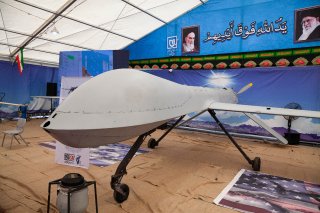Iranian Proxies Wreak Havoc Beyond the Middle East
Azerbaijan and Pakistan are two lesser known victims of Iranian proxy attacks.
Three months after exchanging tit-for-tat airstrikes, Iran and Pakistan are patching diplomatic wounds. Iranian President Ibrahim Raisi embarked on a three-day trip to Pakistan on April 22, where he and senior Pakistani leadership committed to strengthening bilateral ties. Reconciliation may be underway, but rest assured, Iran is not done stirring trouble in Pakistan—or beyond.
For years, Iran has encircled Israel with a “ring of fire,” raising proxies on Israel’s borders that are armed and ready to strike at Tehran’s behest. Iran-backed Hezbollah dominates Lebanon, a country stuck in political gridlock without a president and on the brink of economic collapse. Iran exploited the civil war in Syria to transform the country into a forward base for Iran’s Islamic Revolutionary Guard Corps (IRGC). The Iran-backed Houthis plunged Yemen into one of the world’s worst humanitarian disasters and wreaked global havoc this year by effectively closing off vital Red Sea shipping lanes to commercial traffic. And Iran-backed forces in Iraq are undermining Baghdad’s sovereignty while reportedly looking to destabilize Jordan by arming fighters in the kingdom.
The Islamic Republic of Iran is hellbent on destroying the State of Israel. But more than that, the revolutionary regime is committed to exporting its rogue ideology across the world. To Iran’s southeast, Iran-backed forces are stoking violence in Pakistan. To the northwest, Iranian agents are breeding instability in Azerbaijan. From the Middle East to South Asia and to the Caucasus, Tehran is fomenting violence and unrest everywhere it can.
While Iran and Pakistan have shared a tense relationship and border for years, tempers flared in January when the two countries exchanged airstrikes on either side of their shared border. On January 16, Iran launched strikes against Jaish al-Adl, a separatist Sunni Baloch militant group based in the Iran-Pakistan border region. Jaish al-Adl accuses Shia Iran of repressing its ethnic Baloch minority—and Iran accuses Pakistan of turning a blind eye to Jaish al-Adl.
Pakistan subsequently suspended diplomatic ties with Iran and, two days later, struck “terrorist hideouts” in Iran, targeting the Balochistan Liberation Army (BLA) and the Balochistan Liberation Front (BLF), two separatist groups that pose a threat to Pakistan. The BLA, BLF, and Jaish al-Adl are all U.S.-designated terrorist organizations.
Diplomatic relations between Pakistan and Iran resumed at the end of January. However, Islamabad still had unfinished business. In April, Pakistan designated the Zaynabiyoun Brigade—an IRGC-led group comprised of Pakistani nationals—as a terrorist organization. Originally formed to fight on behalf of Iran-allied Syrian dictator Bashar al-Assad, the Zaynabiyoun Brigade has become increasingly active inside Pakistan. Islamabad found that between 2019 and 2021, the brigade was “actively involved in terrorist activities” at home.
Pakistan started to crack down on the Zaynabiyoun Brigade in 2020, arresting multiple militants and opening a probe into a money laundering network connected to the group.
Iran’s efforts to spread its malign influence and dominate larger parts of the map don’t end there. Elsewhere in the Caucasus, Azerbaijan is weathering its own Iranian threat.
Relations between Iran and Azerbaijan have long been sour, in large part because Iran is home to a significant Azerbaijani minority. Tehran holds longstanding fears of subversion by ethnic Azerbaijanis and, for decades, has supported Armenia in its conflict with Azerbaijan over the disputed Nagorno-Karabakh region. Tensions between Iran and Azerbaijan escalated in 2020 after Azerbaijan recovered territory from Armenia in the Second Armenia-Azerbaijan War.
Azerbaijan has also sought strategic partnerships with Turkey and Israel—both, for different reasons, at odds with Iran—deepening the Tehran regime’s distrust of Baku.
In recent years, Azerbaijan has stepped up its campaign against domestic Iran-backed networks. Since 2022, Baku has carried out several waves of arrests, rounding up Iranian agents engaged in a variety of destabilization activities, including members of the Huseyniyyun—the IRGC-backed Islamic Resistance Movement of Azerbaijan.
In April 2023, Azerbaijani authorities arrested six individuals who Baku said were “recruited by Iranian secret services” to establish “a Sharia state in Azerbaijan through armed unrest and violent overthrow of Azerbaijan’s constitutional order.” The next month, law enforcement arrested at least nine people whom Tehran recruited to plot the “violent overthrow of the government and the assassinations of prominent personalities and senior officials,” according to Azerbaijan’s Interior Ministry.
No doubt, the Iranian threat is virulent. Pragmatic states in the Middle East and the Gulf recognize this, which is why they are putting aside grievances against each other to contest Iranian aggression as a team. That effort was on full display the night of April 13, when countries like Jordan and possibly Saudi Arabia helped repel Iran’s unprecedented drone and missile attack against the State of Israel.
Weeks ago, the Gulf Cooperation Council released a “Vision for Regional Security” that implicitly denounces Iran and invites the West to address Tehran’s destabilizing and malignant threat jointly. The United States and the broader West should heed this call. It’s time for the international community to roll back Iran’s destructive campaign before it’s too late. Iran’s nuclear ambitions must be halted, its ballistic missile program curbed, and its terror activities stopped.
Dr. Eyal Hulata is Israel’s former National Security Advisor and head of the National Security Council. He is currently a senior international fellow at the Foundation for Defense of Democracies (FDD).
Natalie Ecanow is a research analyst at the Foundation for Defense of Democracies, focusing on the Middle East.
Follow FDD on X @FDD.
Image: Shutterstock.com.

